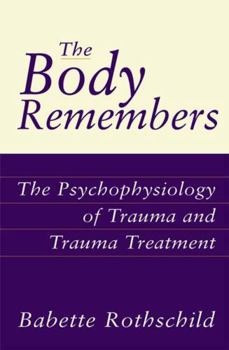The Body Remembers: The Psychophysiology of Trauma and Trauma Treatment
Select Format
Select Condition 
Book Overview
This book illuminates that physiology, shining a bright light on the impact of trauma on the body and the phenomenon of somatic memory.
It is now thought that people who have been traumatized hold an implicit memory of traumatic events in their brains and bodies. That memory is often expressed in the symptomatology of posttraumatic stress disorder-nightmares, flashbacks, startle responses, and dissociative behaviors. In essence, the body of...
Format:Hardcover
Language:English
ISBN:0393703274
ISBN13:9780393703276
Release Date:October 2000
Publisher:W. W. Norton & Company
Length:208 Pages
Weight:1.07 lbs.
Dimensions:0.8" x 6.4" x 9.7"
Related Subjects
Alternative Medicine Compulsive Behavior Healing Health, Fitness & Dieting Health, Fitness & Dieting Medicine Mental Health Neuropsychology Pathologies Post-traumatic Stress Disorder Psychology Psychology & Counseling Psychopathology Psychotherapy Psychotherapy, TA & NLP Surgery TraumaCustomer Reviews
5 ratings
You don't know how good this book is
Published by Thriftbooks.com User , 21 years ago
It's *very* good because it's so physiological and common-sensical. As a survivor of nine years of direct and indirect abuse, I say, no book I've read on post-traumatic stress describes it so accurately. Although the symptoms are anxiety-related, it is really a memory problem, not of "repressed" memory (there's no such thing), but of intense psycho/physiological reactions triggered by the feeling that the trauma never ended. Post-traumatic stress means the trauma isn't yet a memory - it's still feels like here and now, instead of there and then. Undoing the trauma means disarming the triggers, so that it becomes no more than a bad memory.
Excellent explanation of WHY trauma affects us so deeply
Published by Thriftbooks.com User , 22 years ago
I highly recommend this book for anyone who has ever wondered why traumatic experiences, such as abuse, can have such a devastating impact on a person's mental health and well-being. This book explains HOW trauma affects the brain and the body, and offers insightful treatment recommendations for how to heal from trauma. This book is a MUST for any therapist who works with traumatized clients!
Feedback from a Trauma victim
Published by Thriftbooks.com User , 22 years ago
For 30 years, since a young child, I have suffered from a variety of unexplained problems, self-destructive behaviors and senseless actions. Until now, I have never understand what haunts and controls me. But I recently went to counciling and was diagnosed with PTSD so I purchased this book to learn more about it. There are no words to express the relief and overwhelming "connection" I felt when I started reading. I literally had to lay the book down after every paragraph to give myself a moment to absorb the impact of recognition I experienced when reading about myself. I have since been taking the book to my counciling sessions to discuss my revelations - one at a time. This book has saved my sanity - for once, I am beginning to understand the nameless fears and anxieties that have permeated every aspect of my life and robbed me of any real joy. This book lays down a very understandable framework of PSTD, from the development of the disorder to the healing work to move on. And I'm only on Chapter 4! *If you are a victim, take your time when reading this, it can be overwhelming to try to understand everything at once and I suggest a support system to share your discoveries with - best wishes - you CAN recover from this!!
Theory actually useful to trauma treatment
Published by Thriftbooks.com User , 23 years ago
After more than 20 years treating trauma survivors I all too rarely find a new book from which I really learn something that I can immediately apply to my work. This is such a book. The relationship between the physiological reactions to serious trauma and helpful methods of treatment are detailed in accessible, clear fashion, complete with understandable diagrams and case examples with extensive and relevant transcriptions. Experienced and not-so- experienced clinicians will be delighted to find a minimum of jargon and a humane and well-thought-out attitude throughout.
Wonderful! Trauma theory in digestible bites!
Published by Thriftbooks.com User , 24 years ago
I recently read Babette Rothschild's (2000) new book "The Body Remembers: The Psychophysiology of Trauma and Trauma Treatment" (published by W.W. Norton). In this book Babette does a wonderful job of explaining complex psychobiological processes in easy to understand, digestible bites. This book provides a solid theoretical framework for the close relationship between psychobiology, implicit and explicit memory storage and retrieval, and trauma processing. Babette's book also thoroughly explains the importance of "body memories" in trauma processing and discusses many ways in which to help clients both elicit and integrate dysfunctionally stored cellular memories. By providing a concise, understandable and useful overview of trauma theory, Babette's book serves to help close the learning gap between theory and application. In fact, I have recommended that this book be used as one of the texts for clinical theory classes in the graduate program where I am privileged to teach. I also believe this book would be very helpful to trauma clinicians in general. Accordingly, I will begin recommending this book at all my presentations(and did so for the first time recently). No matter the general theoretical foundation of the clinician (ie: psychoanalytic, CBT, etc.) this book provides valuable information that informs trauma practice. In addition, Babette offers many graphics, charts, case studies, and exercises that could be very helpful in explaining the "trauma response" and trauma therapy to clients, families, students, supervisors, and policy makers. As by now you have no doubt guessed - I highly recommend this book.Sincerely, Pati Zimmerman, (MSW, Clinical Traumatologist, Ph.D. Student, and adjunct faculty member at Portland State University and Concordia University.)






